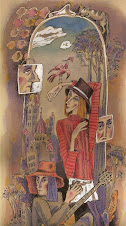REFLECTIONS
Thoughts on Writing
Ten Most Helpful Things I Could Ever Tell Anyone About Writing
“Do you have any advice for writers?”
The magazine interviewer asking me the question was a young freelancer who was working a novel. She had a hopeful look on her face and she half-reminded me of myself when I was setting out to write fiction.
What I knew about writing was mostly a distillation of a lot of classes, experience, trial and error, reading, luck and life, yet I had benefited enormously from writers who’d laid their gleaned bits of wisdom on the table for me to pick through. Writers like Dorothea Brande and Brenda Ueland, whose ingenious books-- Becoming a Writer and If You Want to Write-- I’d reread so many times the pages had fallen out. My answer to the young woman turned out to be a quickly conceived list of things that had been important to me over the years.
Later I decided to write them down, calling them The Ten Most Helpful Things I Could Ever Tell Anyone About Writing. The title is a little exaggerated, but the truth is that everything on the list has been invaluable to me. Some items are specific to the craft of writing, and some are about creativity in general. I’m passing them along with the idea that even if you’re not a writer, you might still rummage through this and find something useful.
1.Pay Attention
I honestly believe that the quality of a writer’s work has a direct correlation to the quality of his or her attention. I have to remind myself all the time to show up in my moments with all my antennae switched on. Sometimes as a writing exercise, I walk around practicing paying attention. I try to really see the thing before me with new eyes, to find a fresh meaning for it, or a unique way to describe it. It helps if I pretend I’m brand new to planet earth, like I just stepped off the space craft. How would a Martian describe an umbrella? A dentist drill? A manatee? Whenever my mind slips out of its habitual way of perceiving life, my writing perks right up; I am given some realization, a little gift from the muses. As the composer John Cage said: “I am trying to be unfamiliar with what I am doing.” That’s it, exactly.
2.Ask: What does my character want?
For me that is the single most important question to ask when writing a novel. I need my main character to want something very badly, and I need to understand completely and utterly what it is. That’s because this thing, or tangle of things, will become the driving force of the book. Everything will spill out of it-- who the character is, the theme, the conflict, most of the forward momentum of the story. When Lily, my character in The Secret Life of Bees, first appeared to me, I didn’t start writing until I knew what she wanted. One day it hit me. Her mother! She wanted her mother. I began writing then, carried on the momentum of her desire.
3.Tap the River
The way I see it-- the well springs of the creative life are deep inside of us. It’s the place where images are bred, thoughts and feelings are converted into meaning, dreams are choreographed, myths congregate, and the soul talks. Some call it the subconscious, the matrix, or the source of our psyche. I picture it as an underground river, and as far as I’m concerned, the water is composed of genius. I try to dig down to it in a few places and lower my bucket. Which is why I write down most of my dreams. Dreams can be confounding, yes, but occasionally they drop something priceless into my lap. I got the whole ending of The Secret Life of Bees from a dream. I also create a collage for each book. Yes, I tear pictures out of magazines and collect postcards, choosing images that fascinate me, and then I paste them on a board, which becomes a loose story board for my novel. I could go on and on. There are a hundred ways to tap the river.
4.Find the Third Thing
When it comes to creative ideas, people always told me it was best to go with the first thing I thought of. I do see the wisdom in this; undoubtedly there are times when you need to stick with your initial instinct. When it comes to writing, however, I personally find that it’s not the first thing I think of that works magic, but the third. The idea that occurs to me first is usually something meant to jumpstart my imagination. Same with the second thing. I take them as “educational toys” for my imagination to play with. If I can hold these two, often opposing ideas in my head long enough, they inevitably generate a third un-imagined possibility. It might be a creative hybrid of the first two ideas or sometimes a completely new creation. The point is to allow a real evolution of your creative thought.
5.Allow yourself to write badly.
I can write some really terrible stuff. Every time I begin a book, a chapter, a paragraph, and sometimes even a measly sentence, I find myself temporarily writing badly. What I want you to know is that I give myself full, unqualified permission to do this. I love the freedom of writing badly. Perfectionism kills the spirit of writing faster than anything I know of. It’s best to just stop all that self-conscious struggling for instant excellence and begin. After a while, the bad writing will start to flip over into something much better, possibly even wonderful.
6.Loiter
The word doesn’t have a great reputation. If you look it up, it says: To pass time without working. I believe in working hard. But I also believe there are times when my writing suffers from a lack of loitering. I try to go out to my dock every morning and just sit there, watching the wind blow. I can’t really tell you why this is crucial for my writing, it just is. Maybe it works because the imagination needs that little bit of downtime to browse around, to go off and play with an image without being rushed along. Maybe the mind simply needs a breather, some mindless diversion. I’m told that Einstein got his best ideas not while working, but while shaving, so there must be something to it.
7.Err on the side of audacity.
One day it occurred to me that most writers, myself included, erred on the side of being too careful in their writing. I made a pact with myself that I would quit playing it safe when what the story really wanted... what my heart really wanted, was to take a big chance. The best writing requires some daring-- a little literary skydiving. Look at your idea and ask yourself: how can I make this larger? The novelist E. M. Forster once said that a novel should deliver a series of small astonishments. After I finish each chapter, I read it with an eye toward figuring out where I’ve played it safe, where I backed off, where the small astonishment was lost.
8.Trust yourself, but listen to others (Certain Others)
As a beginning writer, I had to learn to trust my own creative instincts, but at the same time, gather a handful of trusted readers who would tell me the unmitigated truth. I had to learn how to detach enough from my work to listen genuinely to their advice and criticism, to see my work through their eyes. It is a difficult thing to sort out, but with practice I figured out how to stand by my best, most authentic impulses and words, while letting go of or revising the parts of my work that really were wrong, extraneous, unaffecting and plain mediocre. I eventually became ruthless about cutting my work. Sometimes it’s like pruning a tree-- the best work grows from the severed place.
9.Hurry slowly.
Getting the pace of a story right keeps me up at night. I have a horror of sitting on a plane, next to someone reading my book, and seeing her flip over to see how many pages are left in the chapter. You want a reader so caught up in the spell of a story it would never occur to her to pull herself away and count how many pages she had to read before she could stop. A lot of the time the spell gets broken because the pace has bogged down; three paragraphs about the shape of the oak tree is enough already. Or it’s broken because things are moving so fast the reader doesn’t have time to enter the inner sanctum of the characters’ lives. I like the story to hurry slowly. I want the pace to clip along, but I also want to explore my characters, and render the world they live in with detail and layers of nuance. I think readers start counting pages when these two things get out of balance.
10.Find the symbolic core of the book (or let it find you)
By this I mean, see if there isn’t a powerful and compelling image that dwells at the heart of the story, and that functions symbolically, pointing to deeper meanings. A symbolic core in The Secret Life of Bees is the hive-- a community of females organized around a queen. In The Mermaid Chair, the symbolic core is a mermaid saint. I didn’t plan either of these. They more or less seeped out of the characters and the setting. The worst thing would be to force or impose something like this into a story. It has to develop organically, quietly. I’m simply saying you may want to try and notice this. It will find you if you let it.
I Left MAGA Host SPEECHLESS on CNN
1 month ago










No comments:
Post a Comment